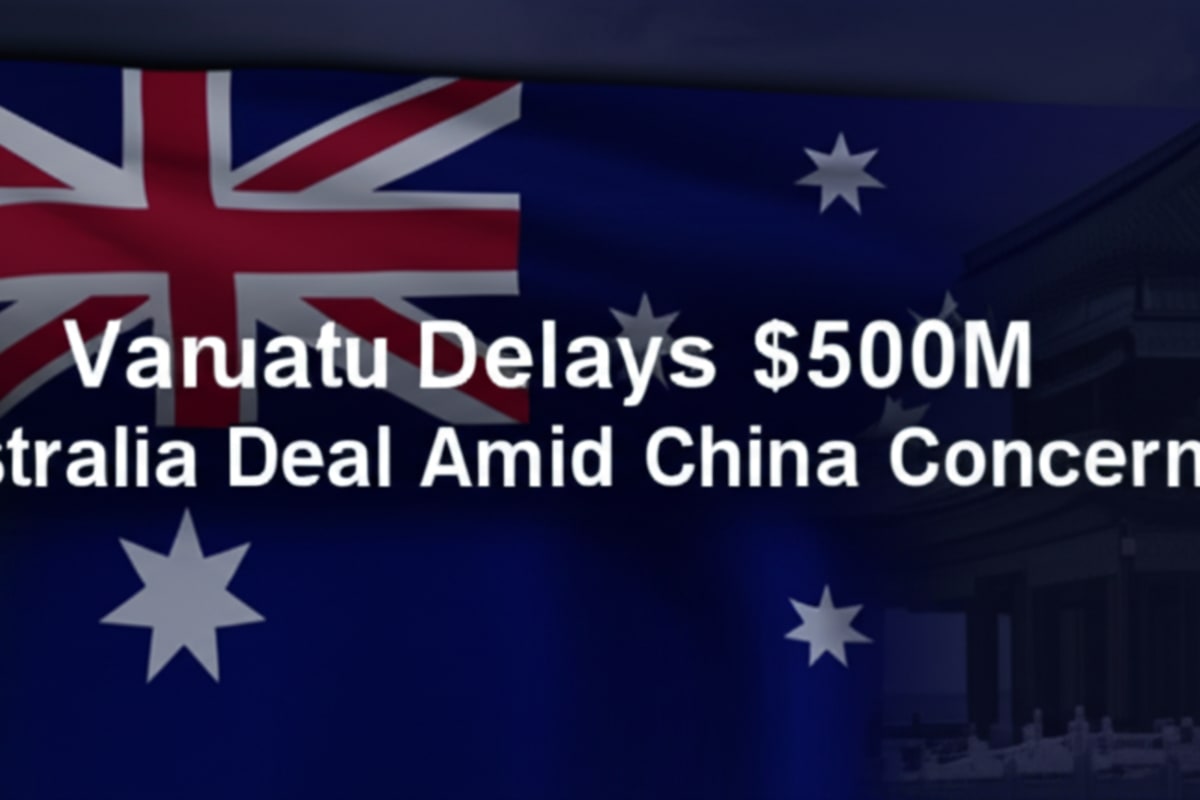Vanuatu Delays $500M Australia Deal Amid China Concerns

Australian Prime Minister Anthony Albanese's recent visit to Vanuatu concluded without the anticipated signing of the $500 million Nakamal infrastructure agreement
Background
This outcome underscores the escalating geopolitical competition in the Pacific region, where China's influence is increasingly felt
The Nakamal agreement aimed to bolster Vanuatu's infrastructure with Australian assistance, encompassing projects such as road upgrades, port development, and renewable energy initiatives
However, Vanuatu's Prime Minister Jotham Napat voiced concerns about potential conflicts with existing or future infrastructure funding opportunities, particularly those emanating from China
This postponement represents a significant setback in Australia's efforts to maintain its strategic position in the Pacific.
While Australia offers substantial development aid, coupled with long-standing security cooperation, China's investment strategy, often characterized by less stringent governance and transparency requirements, holds considerable appeal for Pacific Island nations grappling with substantial infrastructural deficits
This dynamic presents a complex challenge for nations seeking to balance development needs with geopolitical considerations
For Vanuatu, the decision to delay the signing of the Nakamal agreement reflects a pragmatic approach aimed at securing the most advantageous outcome for its development agenda
Balancing the benefits of cooperation with Australia – a key security partner and historical ally – with the potential economic advantages offered by China necessitates a careful and calculated strategy
Prime Minister Napat's emphasis on the need for "more discussions" suggests a desire to thoroughly explore all available options, maximize national benefit, and effectively leverage competing offers
This includes assessing the long-term sustainability and impact of each potential partnership
This situation highlights the inherent limitations of traditional aid approaches in an era of intensified geopolitical rivalry.
Australia needs to adapt its strategies to effectively compete with China's increasingly assertive engagement
This requires not only providing competitive financial assistance but also demonstrating a genuine understanding of Vanuatu's specific developmental priorities and, crucially, respecting its sovereignty in choosing funding partners
Moreover, fostering long-term partnerships built on mutual trust and shared values is paramount
The delay also raises pertinent questions about the transparency and overall efficacy of Australian aid programs.
While Australia consistently champions its commitment to good governance, sustainable development, and transparent financial practices, the apparent lack of foresight regarding China's potential influence casts doubt on the overall effectiveness of its engagement strategies
A more nuanced and proactive approach, one that anticipates and addresses potential competitive pressures, is crucial for maintaining and strengthening relationships within the region
This requires a deeper understanding of the nuances of local politics and the specific needs of each Pacific Island nation
From a Southeast Asian perspective, this situation offers invaluable lessons.
Many Southeast Asian nations also confront the complex challenge of balancing relations with major global powers, particularly China and Western countries
Vanuatu's case serves as a stark reminder that development partnerships necessitate a comprehensive and multifaceted strategy, one that considers factors beyond mere financial assistance
Transparency, mutual respect, and a clear, shared understanding of the recipient nation's developmental goals are paramount for achieving successful and, crucially, sustainable outcomes
Neglecting these factors can lead to unintended consequences and undermine long-term partnerships
The future of the Nakamal agreement remains uncertain.
While Prime Minister Albanese expressed confidence in its eventual signing, the delay serves as a clear signal of the need for Australia to reassess its approach
This involves actively addressing Vanuatu's concerns, offering flexible and tailored solutions that align with its specific developmental objectives, and demonstrating a genuine commitment to a mutually beneficial partnership rather than a transactional relationship
This may require revisiting the terms of the agreement, exploring alternative funding mechanisms, and engaging in more in-depth consultations with Vanuatu's government and civil society
Ultimately, this incident underscores the intensifying geopolitical competition in the Pacific, requiring Australia, and other regional players, to develop more sophisticated, adaptable, and culturally sensitive strategies for engaging with Pacific Island nations
Ignoring the strategic dimensions of aid and development, and failing to prioritize long-term partnerships based on mutual respect and shared values, could result in further setbacks in this strategically vital region
Key Insights:
- Australia's strategic challenge in the Pacific amidst growing Chinese influence.
- Vanuatu's pragmatic approach in balancing relationships with Australia and China to maximize its developmental benefits.
- The critical need for Australia to adapt its aid strategies to remain competitive, relevant, and aligned with the priorities of Pacific Island nations.
Contextual Analysis: The incident reflects the escalating geopolitical competition between Australia and China in the Pacific Islands region. This competition significantly influences development aid strategies, infrastructure projects, and overall regional stability. Southeast Asian nations are closely observing this dynamic, as they face similar strategic challenges in navigating their own relationships with major global powers.
